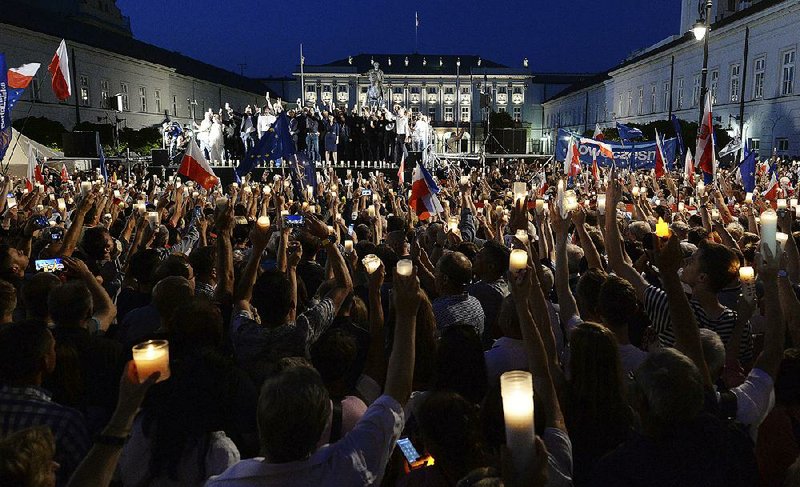Polish court redo closer; protests flare
WARSAW, Poland — The Polish parliament’s lower house voted Thursday to approve a contentious law that gives control of the nation’s Supreme Court to the president instead of judges.
The bill on the Supreme Court has drawn condemnation from the European Union and has led to protests. Critics say it kills judicial independence and violates the rule of law.
The new law, proposed by the ruling Law and Justice party, gives the nation’s president the power to influence the court’s work and to appoint its judges. It calls for the dismissal of the court’s current judges, except for those chosen by the president. It rearranges the court’s structure and adds a Disciplinary Chamber that would handle breaches of rules or ethics in the justice system.
The bill still needs to win approval from the Senate, which will consider the bill at a session today, and from President Andrzej Duda.
On Thursday night, protesters held up candles, waved national and EU flags and chanted “free courts” and “democracy” in front of the Presidential Palace in Warsaw.
Mariusz Mrozek, a Warsaw police spokesman, said about 14,000 people participated. City Hall estimated the crowd at 50,000.
The crowd later moved to the parliament building, where a Senate commission was debating the bill.
China holds U.S. student over cabbie fray
BEIJING — Police in central China arrested an American college student on charges of intentional injury after an altercation with a taxi driver, U.S. officials said, while his mother said police were demanding a “ransom” for his release.
Guthrie McLean was formally arrested in the city of Zhengzhou earlier this week, according to family friend Tom Mitchell, the Beijing bureau chief for the Financial Times.
The arrest stemmed from a June 10 fare dispute in which McLean pushed a taxi driver to the ground because the driver was roughing up his mother, who is hearing impaired, U.S. officials said.
It’s unclear why McLean, 25, a senior majoring in East Asian studies at the University of Montana, was not arrested until weeks later.
McLean’s mother, Jennifer McLean, said police were demanding the equivalent of a $7,400 “ransom” for his release.
U.S. Consulate officials in the provincial capital of Wuhan spoke with Guthrie McLean on Thursday at a detention center in Zhenghou. McLean reported no physical or mental-health concerns, officials said.
Kuwait boots Iran project, some envoys
KUWAIT CITY — Kuwait said Thursday that it is closing the Iranian cultural mission and calling for a reduction in the number of Iranian diplomats stationed in the country, deepening a rift between the Persian Gulf Arab states and Tehran.
The official Kuwait News Agency announced the move in a brief statement, linking the decision to the case of a terror cell broken up in 2015 that authorities allege had contacts with Iran and the Lebanese Shiite militant group Hezbollah.
The Iranian ambassador to Kuwait has been notified of the decision, Kuwait News Agency reported.
Iran’s Islamic Republic News Agency reported that the country’s Foreign Ministry summoned the Kuwaiti charge d’affaires in Tehran to explain the move. The ministry is protesting the call to cut the number of diplomats stationed in Kuwait, the news agency said.
Later, the ministry’s website reported that the spokesman, Bahram Ghasemi, rejected all accusations against Iran and said Tehran will take counteraction.
The 2015 case centers on a group of 26 people known as the al-Abdali cell whose arrests for links to Shiite powerhouse Iran touched on sensitive sectarian issues in Kuwait, a Sunni-majority country.
For 1st time, half with HIV on AIDS drugs
LONDON — More than half of all those infected with HIV — for the first time in the global AIDS epidemic that has spanned four decades and killed 35 million people — are on drugs to treat the virus, the United Nations said in a report released Thursday.
AIDS deaths are also now close to half of what they were in 2005, according to the U.N. AIDS agency, although those figures are based on estimates and not actual counts from countries.
Experts applauded the progress but questioned whether the billions spent in the past two decades should have produced more impressive results. The U.N. report was released in Paris, where an AIDS meeting begins this weekend.
According to the report , about 19.5 million people with HIV were taking AIDS drugs in 2016, compared with 17.1 million the previous year.
